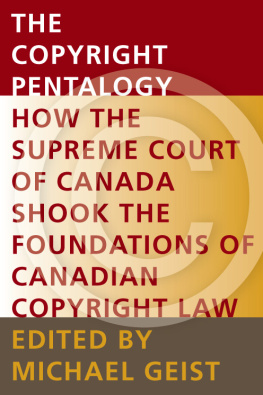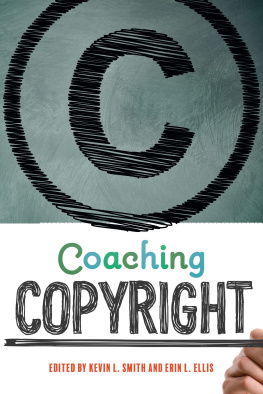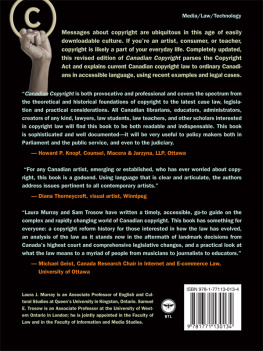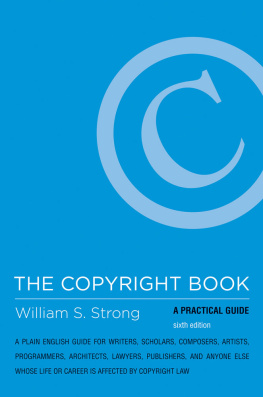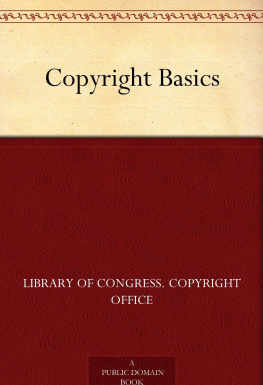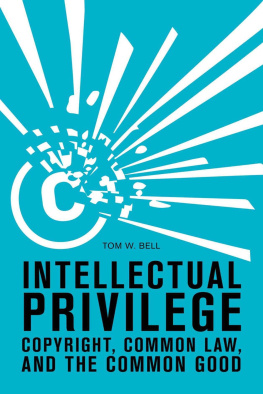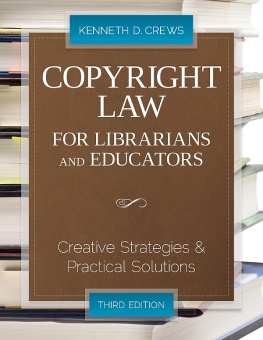Michael Geist - The COPYRIGHT PENTALOGY: How the Supreme Court of Canada Shook the Foundations of Canadian Copyright Law
Here you can read online Michael Geist - The COPYRIGHT PENTALOGY: How the Supreme Court of Canada Shook the Foundations of Canadian Copyright Law full text of the book (entire story) in english for free. Download pdf and epub, get meaning, cover and reviews about this ebook. year: 2013, publisher: University of Ottawa Press, genre: Computer. Description of the work, (preface) as well as reviews are available. Best literature library LitArk.com created for fans of good reading and offers a wide selection of genres:
Romance novel
Science fiction
Adventure
Detective
Science
History
Home and family
Prose
Art
Politics
Computer
Non-fiction
Religion
Business
Children
Humor
Choose a favorite category and find really read worthwhile books. Enjoy immersion in the world of imagination, feel the emotions of the characters or learn something new for yourself, make an fascinating discovery.
- Book:The COPYRIGHT PENTALOGY: How the Supreme Court of Canada Shook the Foundations of Canadian Copyright Law
- Author:
- Publisher:University of Ottawa Press
- Genre:
- Year:2013
- Rating:3 / 5
- Favourites:Add to favourites
- Your mark:
The COPYRIGHT PENTALOGY: How the Supreme Court of Canada Shook the Foundations of Canadian Copyright Law: summary, description and annotation
We offer to read an annotation, description, summary or preface (depends on what the author of the book "The COPYRIGHT PENTALOGY: How the Supreme Court of Canada Shook the Foundations of Canadian Copyright Law" wrote himself). If you haven't found the necessary information about the book — write in the comments, we will try to find it.
In the summer of 2012, the Supreme Court of Canada issued rulings on five copyright cases in a single day. The cases represent a seismic shift in Canadian copyright law, with the Court providing an unequivocal affirmation that copyright exceptions such as fair dealing should be treated as users rights, while emphasizing the need for a technology neutral approach to copyright law.
The Courts decisions, which were quickly dubbed the copyright pentalogy, included no fees for song previews on services such as iTunes, no additional payment for music included in downloaded video games, and that copying materials for instructional purposes may qualify as fair dealing.
The Canadian copyright community soon looked beyond the cases and their litigants and began to debate the larger implications of the decisions. Several issues quickly emerged.
This book represents an effort by some of Canadas leading copyright scholars to begin the process of examining the long-term implications of the copyright pentalogy. The diversity of contributors ensures an equally diverse view on these five cases, contributions are grouped into five parts. Part 1 features three chapters on the standard of review in the courts. Part 2 examines the fair dealing implications of the copyright pentalogy, with five chapters on the evolution of fair dealing and its likely interpretation in the years ahead. Part 3 contains two chapters on technological neutrality, which the Court established as a foundational principle of copyright law. The scope of copyright is assessed in Part 4 with two chapters that canvas the exclusive rights under the copyright and the establishment of new right associated with user-generated content. Part 5 features two chapters on copyright collective management and its future in the aftermath of the Courts decisions.
This volume represents the first comprehensive scholarly analysis of the five rulings. Edited by Professor Michael Geist, the Canada Research Chair in Internet and E-commerce Law at the University of Ottawa, the volume includes contributions from experts across Canada. This indispensable volume identifies the key aspects of the Courts decisions and considers the implications for the future of copyright law in Canada.
Michael Geist: author's other books
Who wrote The COPYRIGHT PENTALOGY: How the Supreme Court of Canada Shook the Foundations of Canadian Copyright Law? Find out the surname, the name of the author of the book and a list of all author's works by series.

